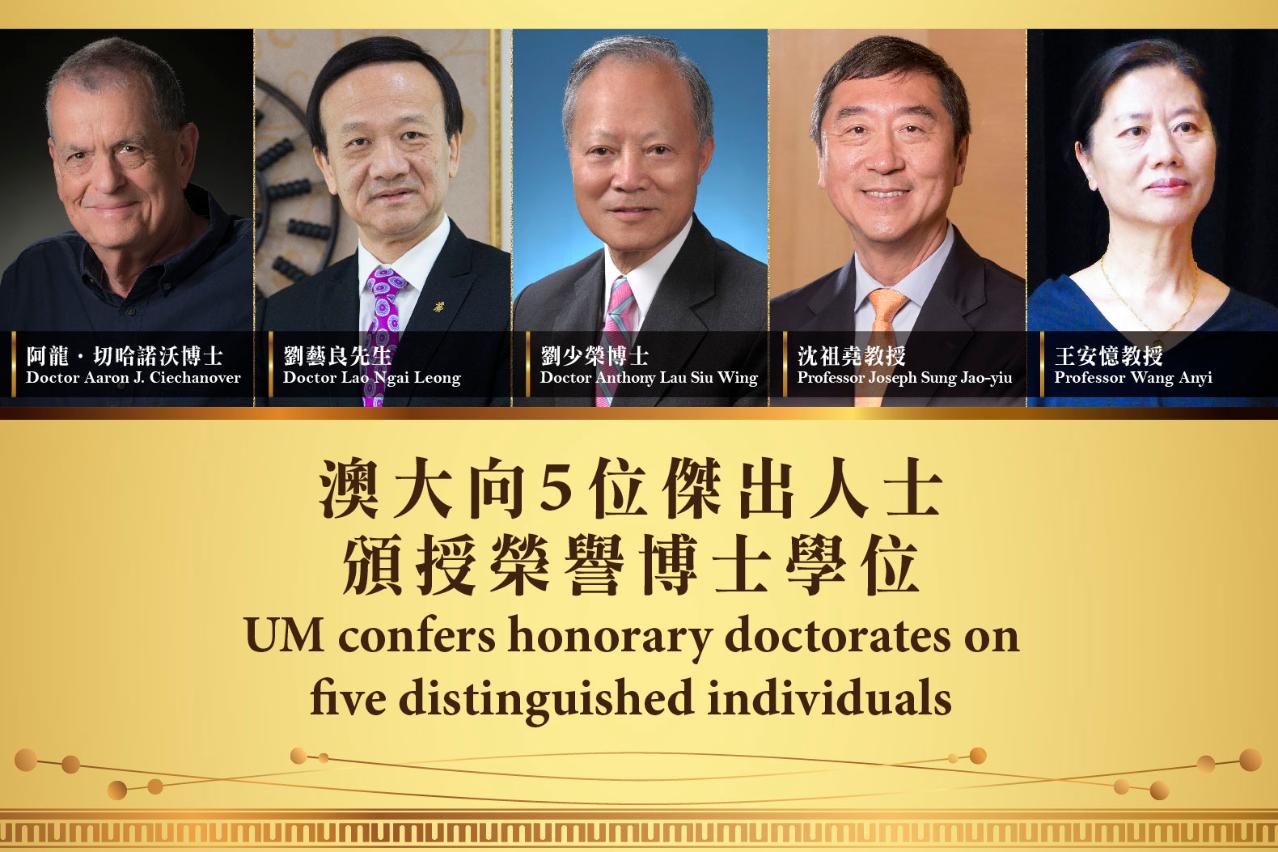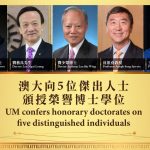 UM will confer honorary doctorates on five distinguished individuals
UM will confer honorary doctorates on five distinguished individuals
The University of Macau (UM) will confer honorary doctorates on five distinguished individuals, namely Aaron J Ciechanover, Lao Ngai Leong, Anthony Lau Siu Wing, Joseph Sung Jao-yiu, and Wang Anyi, for their outstanding achievements and significant contributions to social development and education.
The Ceremony for the Conferment of Honorary and Higher Degrees 2018 will be held on Saturday 1 December at 4:00pm in the University Hall. At the ceremony, Lao Ngai Leong will receive the Doctor of Social Scienceshonoris causadegree. Anthony Lau will receive the Doctor of Business Administrationhonoris causadegree. Joseph Sung will receive the Doctor of Educationhonoris causadegree. Wang Anyi will receive the Doctor of Letters honoris causadegree. Higher degrees will also be presented at the ceremony. The Doctor of Sciencehonoris causadegree for Aaron J Ciechanover will be conferred separately.
Aaron J Ciechanover, an Israeli biologist, shared the 2004 Nobel Prize in chemistry with Avram Hershko and Irwin Rose for characterising a protein called Ubiquitin, which is involved in degrading and recycling proteins in cells. Ciechanover's research focuses on the regulation of transcriptional factors, tumour suppressors, and onco-proteins, as well as the development of novel modalities for the treatment of diseases such as malignancies and neurodegenerative disorders. Ciechanover and the other two Nobel laureates further discovered a polypeptide called ubiquitin that plays an important role in the degradation of proteins in an energy-requiring manner. This groundbreaking finding has led Ciechanover and many scientists around the world to continuously discover new cellular functions, which are important for further revealing the mysteries of biology and exploring the mechanisms of pathogenesis and treatments of human diseases.
Lao Ngai Leong is a native of Chaozhou, Guangdong province. In the 1970s, Mr Lao came to Macao and started business from scratch in a new environment. In addition to outstanding achievements in his career, Lao Ngai Leong has spared no effort to advance social causes and public service in many ways: participating in local politics, serving public organisations, and dedicating himself to education and charity. Having been serving for five terms as a Macao deputy to the National People’s Congress, the supreme organ of state power in China, Lao has made a positive contribution to the communication and collaboration between Macao and mainland China. His more than 20 years of devotion to society has won him numerous accolades. He is the recipient of the Medal of Merit – Industry and Commerce from the Macao SAR government, the World Outstanding Chinese Award, and the 2016 Annual Figures Award from the Outstanding Figures.
A pioneer and veteran in the air cargo and logistics business, Anthony Lau has been closely following UM’s development. He once served as the chair of the University of Macau (Hong Kong) Alumni Association and took active part in various activities aimed at strengthening the bond among the university’s Hong Kong alumni. He was also a member of the Honorary Advisory Board of the Asia-Pacific Academy of Economics and Management at UM. As an alumnus of UM, Lau has spared no effort to support the university’s development, as reflected in his donation to the University of Macau Development Foundation to support whole-person education at UM, and another donation to UM on its 25th anniversary to support its pursuit of high-quality undergraduate education in order to produce future leaders for Macao. As a graduate of UM, he feels deeply proud of the alma mater’s progress in teaching and research and is happy to be a part of the process. He has encouraged other alumni to donate money and support alumni-themed activities at UM.
Joseph Sung is a world-renowned scientist. His research studises have had a major impact on the practice of gastroenterology worldwide. He was hailed the ‘Asian Hero’ by Time magazine for his heroic fight against the severe acute respiratory syndrome (SARS) during its outbreak in 2003. He is a medical doctor extraordinaire and a renowned educationalist, with almost 30 years of experience in higher education. He was the vice-chancellor and president of the Chinese University of Hong Kong, leading the university in its pursuit of excellence in teaching and research. The genteel professor set himself as a role model for students at all times, whether as a professor or as a vice-chancellor. He espouses educational ideals and he cleaves to them; He shepherds students with a sternness that accords with him aptly as an educationalist, but nevertheless is softened with an amicableness that draws him so close to the students.
Wang Anyi, winner of the Mao Dun Literature Award and Lu Xun Literature Award – two of the highest Chinese literary honours – and vice chair of the China Writers Association, is one of the most accomplished and influential writers in China. Wang’s writing career spans decades. Her works amount to some six million words, which testify to the significant contributions she has made to the Chinese literary circle. She is constantly scaling new heights, from her earlier days in writing Zhi Qing (educated youth) literature, to Xun Gen (root-searching) literature, and at a later stage to Hai Pai (Shanghai style) literature. At each stage, she produced impressive works. A talented and prolific writer, she traverses comfortably across different styles and topics. Her masterpieces include Chang Hen Ge (Song of Everlasting Sorrow), Ji Shi Yu Xu Gou (Reality and Fiction), Fu Ping, Bian Di Xiao Xiong (Fierce Heroes Everywhere), Qi Meng Shi Dai (The Age of Enlightenment), and Tian Xiang (Scent of Heaven).


